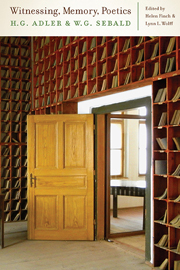Book contents
- Frontmatter
- Contents
- Acknowledgments
- List of Abbreviations
- Introduction: The Adler-Sebald Intertextual Relationship as Paradigm for Intergenerational Literary Testimony
- Part I Intertexts in Context
- Part II Witnessing Trauma and the Poetics of Witnessing
- Part III Memory, Memorialization and the Re-Presentation of History
- Part IV Literary Legacies and Networks
- 9 The Kafkaesque in H. G. Adler's and W. G. Sebald's Literary Historiographies
- 10 Generational Conflicts, Generational Affinities: Broch, Adorno, Adler, Sebald
- 11 “Der verwerfliche Literaturbetrieb unserer Epoche”: H. G. Adler and the Postwar West German “Literary Field”
- Afterword
- Bibliography
- Notes on the Contributors
- Index
11 - “Der verwerfliche Literaturbetrieb unserer Epoche”: H. G. Adler and the Postwar West German “Literary Field”
from Part IV - Literary Legacies and Networks
Published online by Cambridge University Press: 05 October 2014
- Frontmatter
- Contents
- Acknowledgments
- List of Abbreviations
- Introduction: The Adler-Sebald Intertextual Relationship as Paradigm for Intergenerational Literary Testimony
- Part I Intertexts in Context
- Part II Witnessing Trauma and the Poetics of Witnessing
- Part III Memory, Memorialization and the Re-Presentation of History
- Part IV Literary Legacies and Networks
- 9 The Kafkaesque in H. G. Adler's and W. G. Sebald's Literary Historiographies
- 10 Generational Conflicts, Generational Affinities: Broch, Adorno, Adler, Sebald
- 11 “Der verwerfliche Literaturbetrieb unserer Epoche”: H. G. Adler and the Postwar West German “Literary Field”
- Afterword
- Bibliography
- Notes on the Contributors
- Index
Summary
The central concern of the present chapter is with the question of why H. G. Adler's literary works failed to find a wider reading public during his own lifetime. My main focus is on the corpus of letters between Adler and Heinrich Böll which are held, respectively, in the German Literary Archive in Marbach, and the Historical Archives of the City of Cologne. Some of this correspondence has only come to light recently, during the process of review and re-archiving of material which survived the physical collapse of the latter institution in 2009. Following the suggestion of Adler's biographer, I also draw on Adler's correspondence with potential publishers. This material constitutes an interesting case study which offers complementary insights into the West German “literary field” of the 1950s and the two authors' interactions with it. I begin by tracing Böll's early career and in so doing refute the claims made by W. G. Sebald with respect to the later Nobel laureate's novel, Der Engel schwieg. This serves me to point up the insights that a consideration of the publication history of creative work can offer in the wider narrative of literary-historical trends and text reception, and, as a point particularly germane to the present chapter, how a writer's correspondence can be utilized in this regard as an invaluable storehouse of empirical material.
- Type
- Chapter
- Information
- Witnessing, Memory, PoeticsH. G. Adler and W. G. Sebald, pp. 254 - 274Publisher: Boydell & BrewerPrint publication year: 2014



